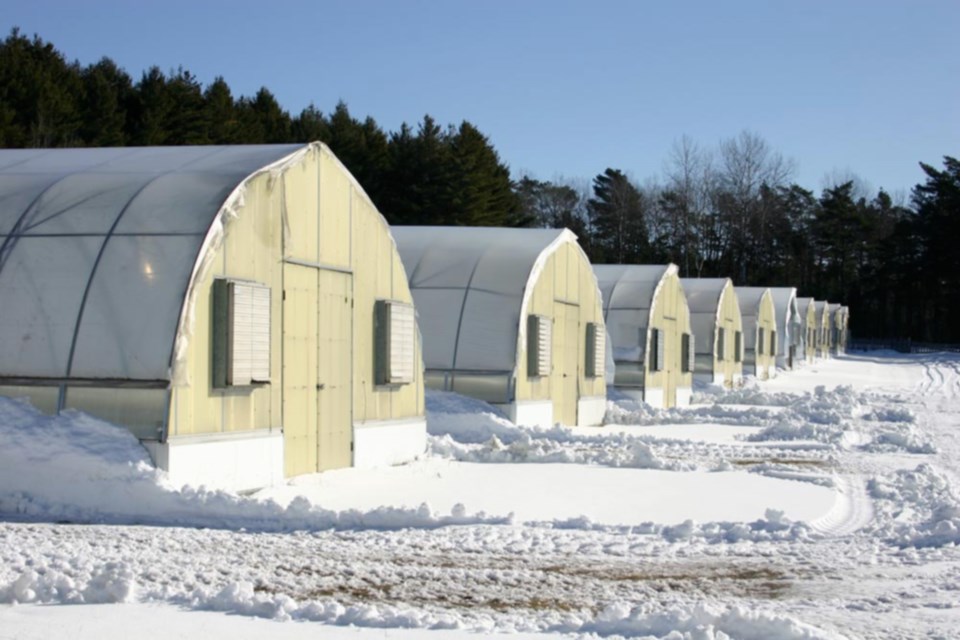An agency providing social assistance and employment services to First Nations along the north shore sees a former tree seedling operation in the Thessalon area as an opportunity to move towards food sovereignty while providing a safe space for those living with mental health and addiction issues or who are caught up in the justice system.
Niigaaniin Services is working in partnership with Thessalon First Nation to repurpose the community’s Bio Centre — a site consisting of greenhouses, 80 acres of farmland and cold storage facilities with a licensed area for organic food processing and packaging — and transform it into a place where fresh produce is grown and distributed to the communities it serves.
“We watched when COVID-19 hit a lot of our communities along the north shore, our First Nation communities, and we really saw barriers to go up to slow the spread. We saw the community members only being allowed to leave their community once on a weekly basis because the First Nations people were so high risk, and there were a lot of safety precautions that were put into place,” said Michelle Seanor, manager of Mino-Bimaadizidaa, a Niigaaniin program that offers a holistic approach to helping people become job ready and employable. “Through the pandemic, we realized that we were really good at food delivery, but we hadn’t really made a lot of progress in terms of food sovereignty and food sustainability for our community members.
“That was the home base for this project, or where we really started looking at how we produce food, grow food along the north shore to help better the lives of our community members and help them move towards food sovereignty.”
Mamaweswen, also known as the North Shore Tribal Council, has committed more than $1 million in funding to retrofit the 16 greenhouses at the Bio Centre, a former Ministry of Natural Resources tree nursery located approximately 20 kilometres northwest of Thessalon First Nation.
Niigaaniin Services Director Elizabeth Richer says her agency started looking at the idea of horticultural therapy as a way to complement its pre-existing land-based detox program for individuals who are heading to treatment.
“That’s what really started this, going from a land-based detox — understanding what we went through in COVID with borders up in our communities — and then really looking at what is the food that’s available, and there’s not a lot of food available,” said Richer. “We have an opportunity to bring fresh produce, and potentially, small game, to communities.”
The labour at the Bio Centre will be provided by community members in need of the wraparound services provided by Niigaaniin Services and its partners.
“It’s going to be a place where our community members who are looking at moving towards life sustainability, who are either coming out of treatment for addictions or looking for transition housing,” said Seanor. “It will be a space where they can live and engage in horticultural therapy by working the land and moving towards a more safe life.”
Niigaaniin has submitted a proposal to the Attorney General of Ontario to house people at the Bio Centre who have been convicted of a provincial offence.
Richer views the proposal as an alternative to sending people to correctional facilities, which could end up saving the province money in the long run.
“We have an opportunity right now for true, alternative justice,” said Richer. “Right now, you have two options with alternative justice, and a lot of people will go with either the probation or they’ll go with house arrest. If you don’t have a home and you’re a couch surfer, there’s not a lot of options for you.
“We have the Gladue report, which brings in those Indigenous factors of colonialism and residential schools and our horrific history, and right now we’re looking at the Bio Centre in Thessalon as an opportunity for individuals to come and serve their provincial sentences there as well — on the land, with the people, in the language, in the culture, and with the horticultural therapy while feeding your neighbours, your family and your community.”
Niigaaniin hopes to begin hiring staff and planting in the greenhouses as early as this winter. Richer says the agency still has to take stock of pre-existing services in the region.
“It’s difficult at the moment because we have all different kinds of services available in the area, whether it’s in our communities or external to our communities, and the services that are currently available are not adequate,” said Richer. “The last thing we want to do is add more demand to a system that doesn’t have the services available.”
Ultimately, Niigaaniin wants to establish a culturally-relevant place for Indigenous Peoples to live and work as part of their recovery and aftercare journey while establishing food sovereignty in First Nations.
“It’s our people taking care of our people, based in our language, in our ceremonies and on the land,” Richer said.



